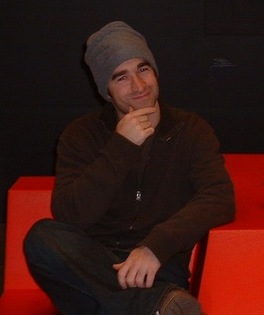David Grinspoon
This evening we saw David Grinspoon read at the Pacific Science Center. Grinspoon was in town to read from his book Lonely Planets : The Natural Philosophy of Alien Life as part of the Seattle Science Lectures Series. The book is about the history, science, and philosophy of the search for extraterrestrial life and won a 2004 PEN Award for the best research in a non-fiction work.
Tonight's lecture focused on the recent findings of the Mars rovers and the Huygens probe that landed on Titan in January. Grinspoon's particular area of interest is in how the findings from these projects have shown encouraging results in our search for life. The lecture covered some of the same areas that Neil deGrasse Tyson spoke about when we saw him three weeks ago, but it also went into new findings that have just surfaced in the last few days. It's exciting to see how much we are learning from these projects. Grinspoon has collected links to a lot of the stuff he spoke about tonight as well as links to other interesting websites related to these issues on his Lonely Planets site, so I won't go into much detail, but here are some of the random facts from the lecture that I found most interesting:
- The two Mars rovers are called the Spirit and the Opportunity. The Spirit originally landed in Gusev Crater which we expected to be a dried lake. Initial evidence from the Spirit seemed to contradict our expectations, but as the Spirit made it's way out of the crater into surrounding areas we began to find evidence that water had indeed existed on Mars at some point.
- The rovers were crash landed on Mars using an air bag system that helped ensure their survival.
- Given the evidence of water, we believe that Mars could have once been home to life. There are currently plans in place to go back to Mars in 2009 to do further studies.
- The rovers were only expected to last 90 days, but they've now been going for over a year!
- The surface of Titan appears to be very active which could indicate that it is still very young in its development phase. An active surface is probably more hospitable to life than an inactive surface like Mars.
- We've found signs of a liquid methane rain fall cycle on Titan.
- Based on evidence coming back from Huygens we are much more excited about going back to Titan for more in depth studies.

NASA Photo of Mars



0 Comments:
Post a Comment
<< Home